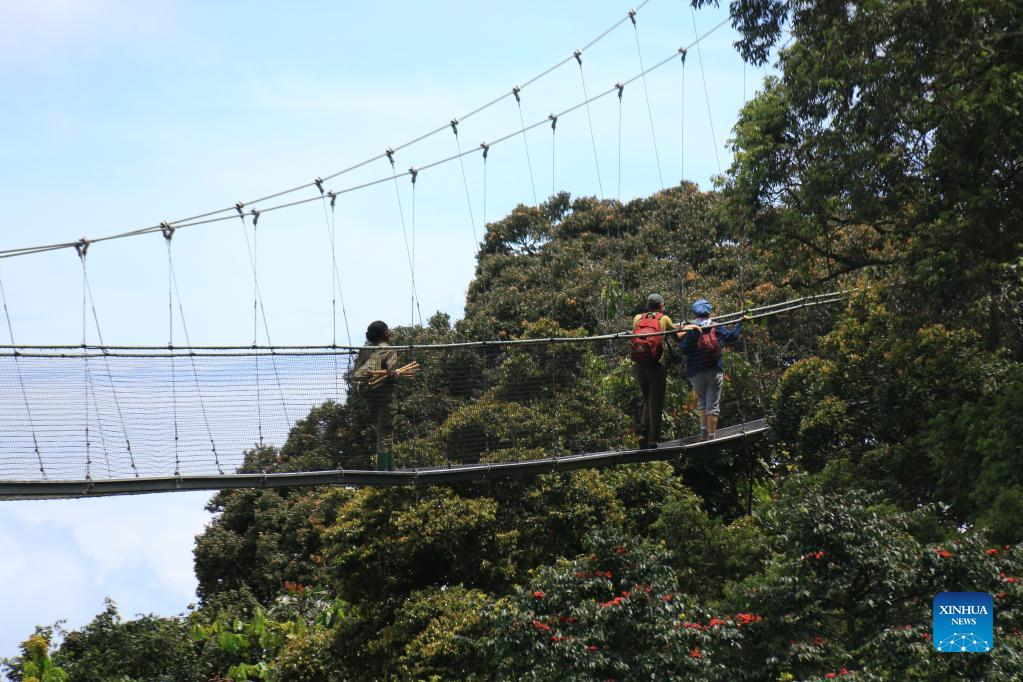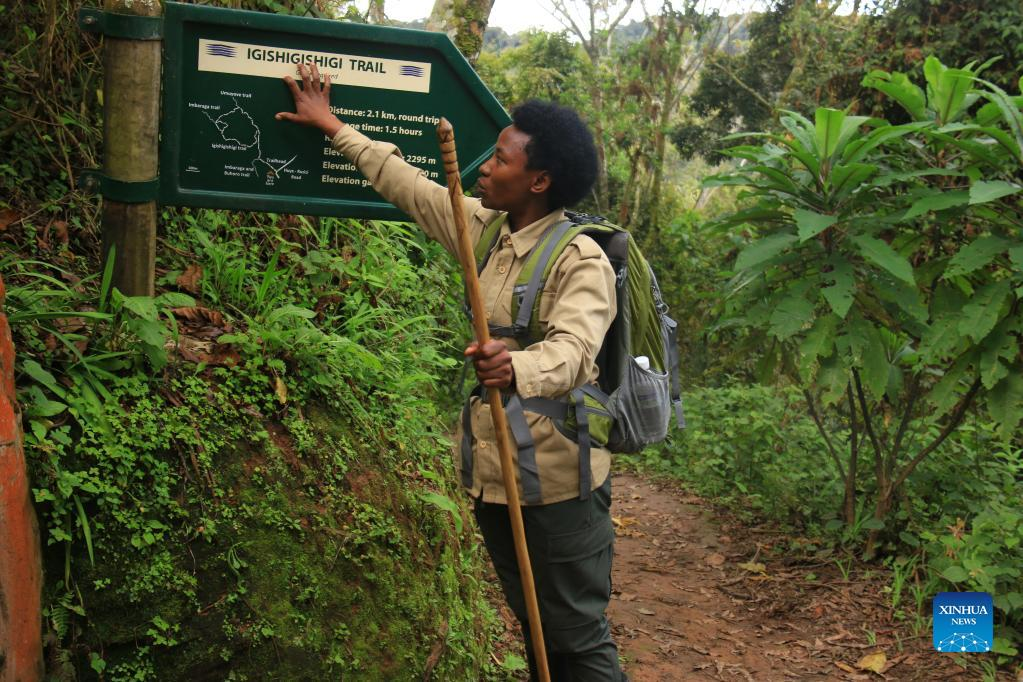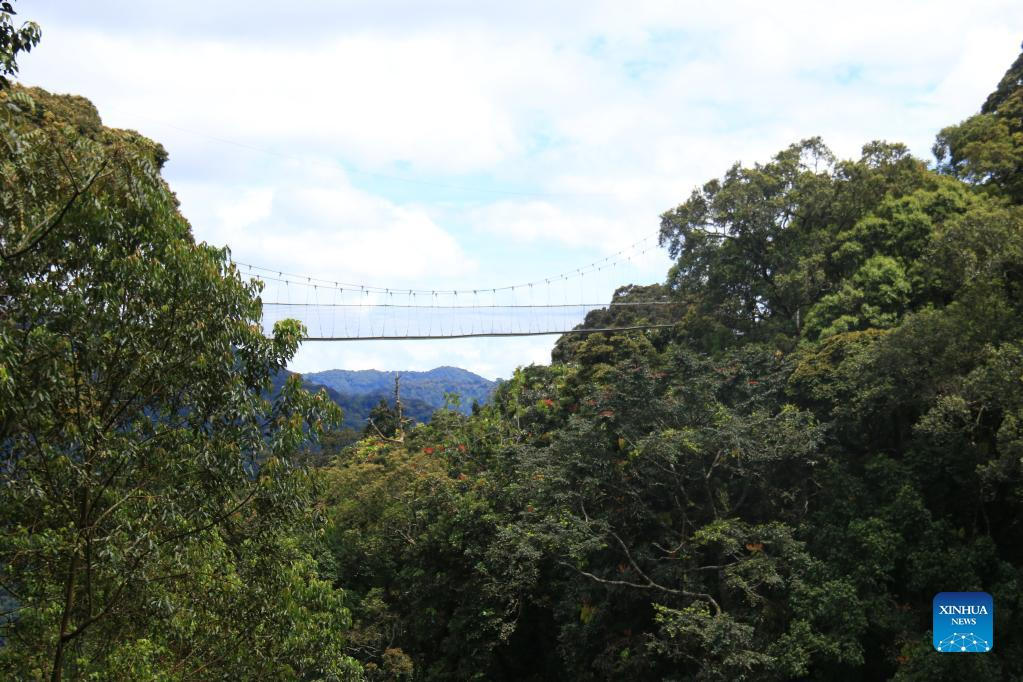
People walk through the canopy walkway in Nyungwe National Park in Rwanda,on May 2, 2022. (Photo by Huang Wanqing/Xinhua)
KIGALI, May 22 (Xinhua) -- Phillomene Nzabonitegeka has a special place in her heart for wildlife conservation.
The 48-year old president of Umurava, a community conservation group in Nyamagabe district in southern Rwanda, is committed to fighting poaching in Nyungwe National Park.
Nyungwe rainforest, home to about 300 bird species, nearly 30 of which are endemic to the Albertine Rift region, 75 known mammal species, 1,068 plant species, and 13 different primate species including the common chimpanzee, is known worldwide as one of the best preserved montane rainforest in central Africa.
The Nyungwe National Park provides 70 percent of Rwanda's freshwater.
But poaching remains a challenge.
That is where Nzabonitegeka and her group come in.
She works with 19 other members of the group protecting biodiversity species in the buffer zone of the park and its environs to lessen the impact of biodiversity degradation on women.
Commonly hunted animals in the park include deer, kobs, duiker, and L'Hoest's monkey.
"The members have been very active combatants of poaching in the park," Nzabonitegeka told Xinhua in an interview. "They do this through sensitization of families and reporting to authorities."
"We realized that the nature reserve is a centrepiece of our economy. Once tourists visit the park, they drum up local business with their dollars. Poachers are a threat to that and we want the residents to know it," she said.
The park is managed by African Parks under an agreement reached with the Rwanda Development Board in 2020.
The women said due to poverty and greed they grew up seeing people hunting for meat in the Nyungwe forest, and destroying the eco-system.
The high-altitude rain forests of Nyungwe were cut back, and poachers looking for meat hunted for the chimpanzee and monkey communities living there.
Nzabonitegeka and her colleagues want to play their part in protectin biodiversity.
"Communities around the park have realized that biodiversity conservation can help them in their efforts against poverty," she said.
The mother of five said that former poachers are now playing a role in sensitizing other community members to fight against poaching and participate in biodiversity conservation programs such as planting trees.
Emmanuel Cyondi, 55, is among those who stopped poaching in Nyungwe National Park after being sensitized about the dangers of wildlife hunting and are now involved in other income-generating activities such as terracing to make ends meet.
"We were illegally hunting for meat then, but it was a dangerous activity," he said. "We are better off now and able to provide for our families without going to the forest hunting."
Cyondi said the Umurava group has played a key role in raising awareness of the negative impacts of poaching on the wildlife in Uwinkingi sector near the park.
An active hunter of wildlife for meat until 2018, he admitted that it took time for him to change his mind about hunting, but said has has since committed to conservation because he understands its importance.
Now I understand that every animal matters in the ecosystem, and needs protection, Cyondi said.
Ex-poachers have been helped to engage in small livestock farming by the government and conservation groups, according to Nzabonitegeka.
She, however, said more training is needed to build the capacity in carrying out communication campaigns to enhance public support for conservation programs.
Started in 2020, the Umurava group's efforts are part of a wider Rwandan government mission to involve communities in conservation endeavors.
The Rwanda Development Board attributes the country's conservation success to active community participation and sound partnerships.
The east African country has four national parks -- Akagera National Park, Nyungwe National Park, Gishwati-Mukura National Park, and Volcanoes National Park.
Communities near the Volcano National Park in northern Rwanda, for example, have been helped to set up arts and craft cooperatives, employing former poachers.
Many ex-poachers now work as porters and guides, helping tourists trek up the mountains to see gorillas.
Ange Imanishimwe, chief executive of Biodiversity Conservation Organization (BIOCOOR), a local non-governmental organization, said the Umurava group has demonstrated responsibility in conservation programs and needs everybody's support.
He said more efforts are need to educate people about the importance of biodiversity.
BIOCOOR helps the Umurava women in their campaign and engages men to let their wives participate in conservation.
If men embrace women's role in biodiversity conservation, Imanishimwe said, it would go a long way in changing community attitudes.
Rwanda has put in place strong laws for wildlife protection. Poaching and wildlife trafficking may lead to one to three years in prison if convicted, and a fine between 500,000 Rwandan francs (about 500 U.S. dollars) and 1 million francs (about 1,000 dollars).
And the punishment is harsher if the offense involves critically endangered or endangered species. ■

A guide tells information about the trail in Nyungwe National Park, Rwanda, on May 2, 2022. (Photo by Huang Wanqing/Xinhua)

Photo taken on May 2, 2022 shows the canopy walkway in Nyungwe National Park in Rwanda. (Photo by Huang Wanqing/Xinhua)
